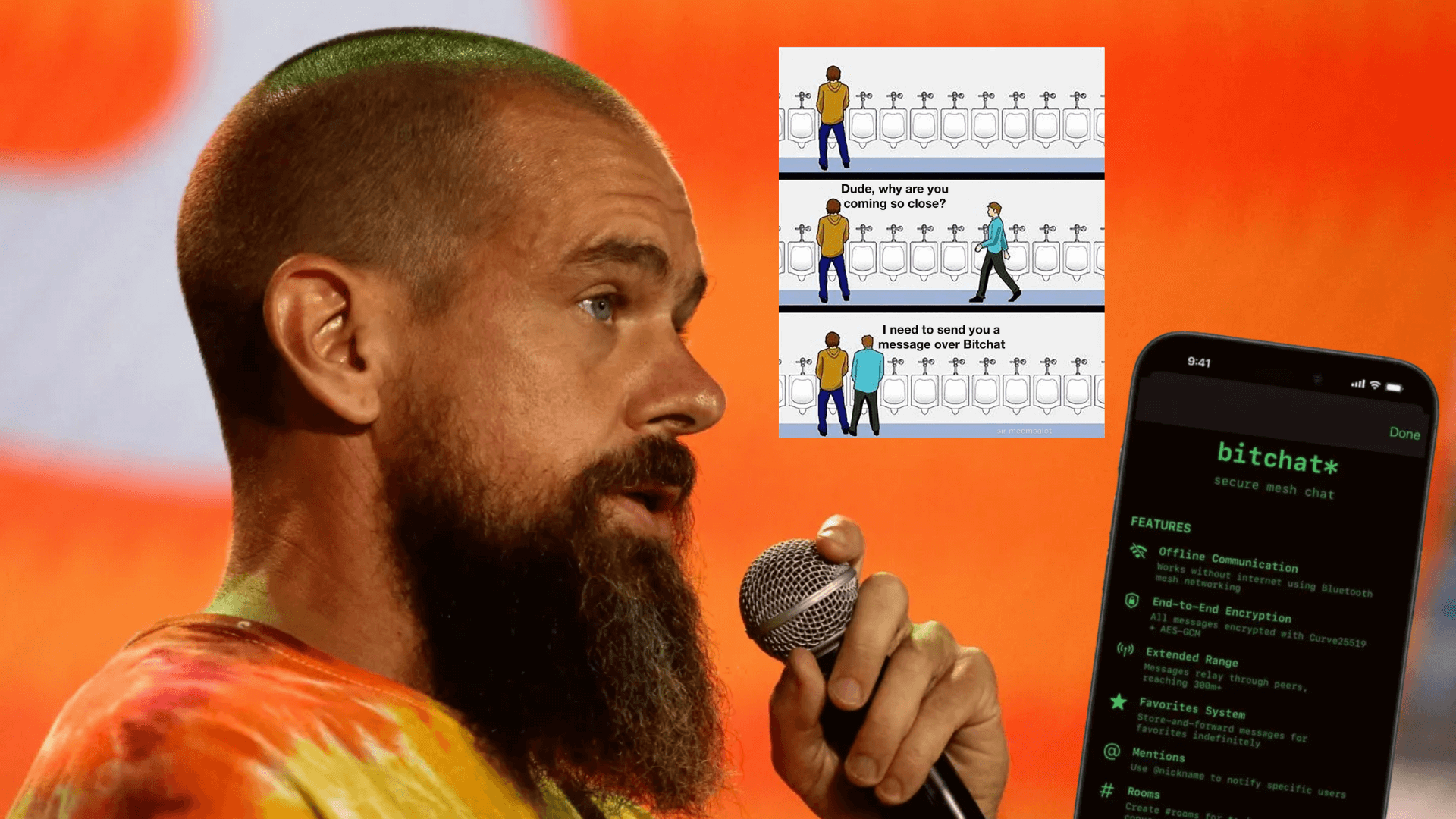The App That Works When Everything Else Fails
Bitchat works when everything else fails. No internet, no cell towers, no servers just Bluetooth mesh networks that get stronger as more people join. What started as Jack Dorsey's weekend coding session became the communication tool refugees and disaster victims need.

What started as Jack Dorsey's weekend vibe coding project to learn about Bluetooth mesh networks has exploded into something much bigger: a glimpse of a different kind of decentralized communication that works when everything else fails. Bitchat, released on July 7th, is a messaging app that requires no internet, no servers, and no phone numbers, just devices in physical proximity creating ad-hoc networks through Bluetooth mesh technology.
Mesh networking isn't new. It's been around for decades, primarily used in military communications, IoT sensor networks, and industrial applications where reliability and redundancy are critical. What's fascinating about Bitchat isn't the underlying technology, but making mesh networks accessible for everyday consumer communication. While mesh networks have typically required specialized hardware and technical expertise, Dorsey and the open source community have built something anyone can use with just their smartphone.
The concept is elegantly simple yet revolutionary in its application. Traditional messaging apps such as Signal, Telegram or Whatsapp depend on centralized infrastructure that can be monitored, censored, or disabled by governments, corporations, or natural disasters. Bitchat creates communication networks using only the devices present around you. Each device acts as both client and server, automatically discovering peers and relaying messages across multiple hops to extend the network's reach. The more people using it in an area, the stronger and wider the network becomes. WTF, how awesome is that!
Dorsey posted the announcement with characteristic understatement:
my weekend project to learn about bluetooth mesh networks, relays and store and forward models, message encryption models, and a few other things.
— jack (@jack) July 6, 2025
bitchat: bluetooth mesh chat...IRC vibes.
TestFlight: https://t.co/P5zRRX0TB3
GitHub: https://t.co/Yphb3Izm0P pic.twitter.com/yxZxiMfMH2
But the cyberpunk-aesthetic app with its terminal-green interface immediately captured imaginations across the tech community.
Within hours, something magical happened that perfectly captures the spirit of open source development. Calle (@callebtc), a physics PhD and open-source developer, announced he'd ported Bitchat to Android and achieved full interoperability with the iOS version in just half a day.
it only took me half a day to port a *native* iOS app to *native* Android with AI.
— calle (@callebtc) July 8, 2025
hardware stack I've never worked with (BLE) and I'm not even an Android dev. it would've required weeks of research if I attempted this just a year ago.
devs who resist AI are so cooked 💀 https://t.co/CfN5CUvMKn
Jack's response was perfect: "bitchat now on android. open source moves fast."
The momentum didn't stop there. Within days, developers across the community had created additional implementations: @shilohsecurity built bitchat-terminal in Rust, while another developer created bitchat-python, both fully compatible with the iOS and Android versions. This is open source development at its finest: a weekend project becoming a multi-platform ecosystem through collaborative effort and shared vision. Nothing beats that!
But the story gets even better. This rapid development is part of Dorsey's larger vision funded through his $10 million investment in "andOtherStuff," a nonprofit collective focused on open-source social media. The group includes Twitter's first employee Evan Henshaw-Plath, Cashu creator Calle, former Truth Social engineering head Alex Gleason, and others. They're not building a company. They're operating like a "community of hackers" experimenting with technologies that could transform social media.
The technical innovation behind Bitchat is impressive. It uses end-to-end encryption with Curve25519 and AES-GCM, supports offline communication through Bluetooth mesh networking, and can relay messages across 300+ meters by hopping through peers. It includes features like favorites systems, mentions, rooms for topic-based conversations, and password-protected secure rooms. Most importantly, it has no tracking, no servers, no accounts, and no data collection.
What makes this particularly exciting is the real-world applications. In warzones, during natural disasters, protests, or in regions with limited connectivity, Bitchat networks remain functional when traditional infrastructure fails. A recent report from the Digital Assets Research Institute found that at least 329,000 displaced people have relied on Bitcoin for financial continuity, with projections reaching 7.5 million by 2035. Bitchat's integration with Cashu (an open-source ecash system) means people can send untraceable digital cash directly between phones via Bluetooth, no internet required.
Cashu deserves explanation for those unfamiliar. It's a free and open-source chaumian ecash system built for Bitcoin that provides near-perfect privacy and user experience. Unlike traditional Bitcoin transactions that are publicly visible on the blockchain, Cashu uses cryptographic techniques to create private, instant, and untraceable digital cash. When integrated with Bitchat, it creates something unprecedented: the ability to send both messages and money through mesh networks that require no central authority or internet connection.
sending bitcoin over bluetooth between bitchat android and iphone. both have a native cashu ecash wallet built in.
— calle (@callebtc) July 17, 2025
the ecash travels directly from phone to phone. the sender needs no internet. like instant and untraceable digital cash.
work in progress. it's going to be insane. pic.twitter.com/FvkqKYGTWC
The development momentum has been relentless. Within days, developers created Rust and Python versions compatible with the iOS and Android apps. The entire project operates under permissionless technology principles: no gatekeepers, no approval processes, just open-source software that anyone can use, modify, or improve. The code is released into the public domain at bitchat.free and on GitHub.
bitchat-terminal
— ricky (@shilohsecurity) July 14, 2025
written in rust & compatible with ios/android.
out now @jack ➟ original / ios @callebtc ➟ android
bitchat-terminal github: https://t.co/YUAj5tUPda pic.twitter.com/VcDVz3mkGX
This connects to Dorsey's broader philosophy about where social media went wrong. In his recent podcast with Evan Henshaw-Plath, he explained: "It's hard for something like [Twitter] to be a company, because you have corporate incentives when it wants to be a protocol." Advertisers can "just remove the money, your money, and your revenue goes down completely. So if [Twitter] were an open protocol, if it were truly an open project, you could build a business on top of it, and you could build a very healthy business on top of it."
The humanitarian implications are staggering. In conflict zones like Ukraine or Gaza, where internet infrastructure gets targeted, mesh networks could maintain communication channels. During natural disasters when cell towers fail, affected populations could coordinate rescue efforts and share critical information. For refugees fleeing persecution, mesh networks provide communication that's impossible to monitor or shut down by authoritarian regimes.
But beyond crisis scenarios, Bitchat represents something deeper: a return to the original vision of the internet as a decentralized network of peers rather than centralized platforms extracting value from users. When Dorsey says he wants to "push the energy in a different direction, which is more like Bitcoin, which is completely open and not owned by anyone from a protocol layer," he's describing a fundamental shift from corporate-controlled communication to truly peer-to-peer networks.
The andOtherStuff team is also working on a social media "Bill of Rights" that spells out what platforms need to provide in areas like privacy, security, interoperability, transparency, identity, self-governance, and portability. This framework could help keep platforms accountable to users rather than advertisers or investors.
Jack Dorsey pumps $10 million into a nonprofit focused on open-source social media | TechCrunch https://t.co/FmjxmqHm2a
— TechCrunch (@TechCrunch) July 17, 2025
What's happening with Bitchat feels like watching the early internet all over again, except this time, we know better than to let corporations capture and centralize the infrastructure. The combination of mesh networking, cryptographic privacy, integrated digital cash, and permissionless development creates something that didn't exist before: truly sovereign communication technology.
The beauty of mesh networks is their antifragility. The more they're attacked or suppressed, the stronger the motivation becomes to use them. Every person who downloads Bitchat makes the network more resilient. Every developer who contributes code makes it more capable. Every crisis that demonstrates the fragility of centralized systems makes the case for decentralized alternatives.
This is what the future of communication looks like: networks that belong to their users, not their shareholders. Technology that works when everything else fails. Money that moves as freely as messages. Code that serves humanity rather than extracting from it.
The revolution will be decentralized.
Download Bitchat: https://bitchat.free/
iOS/Android source code: https://github.com/permissionlesstech/
Join the mesh. Own your communication. Build the future.







